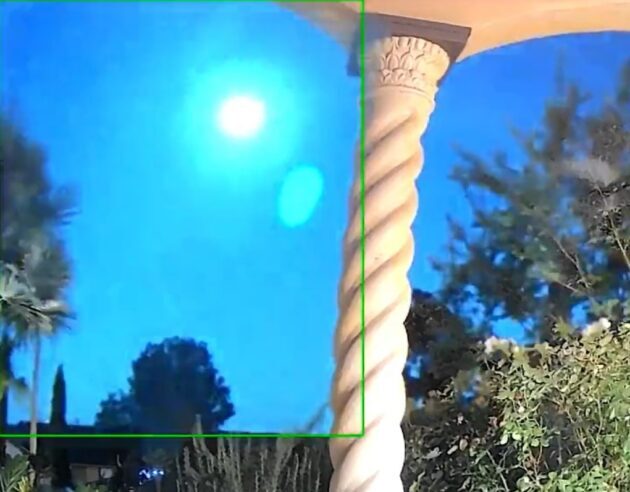What was that flash in Wednesday night’s skies?
Westward-looking skywatchers in locales ranging from Oregon through Western Washington to British Columbia reported seeing a fireball light up the surroundings at 10:18 p.m. PT. And the reason we can time the event precisely is because of the timestamps on all the webcam videos that were posted to Twitter and YouTube.
“OK, that was insane,” Michael Snyder, a weather watcher at Alaska Airlines who also maintains a YouTube channel called Pacific Northwest Weather Watch, said in a tweet. “Dead center screen, there had to be others that saw that monster.”
Indeed there were. Some observers took advantage of the night-sky to indulge in a little black humor about the Mariners’ loss to the Astros in this week’s baseball postseason playoffs.
“Meteor? Satellite? That Astros homer finally returning to Earth? (Sorry),” Jack Clemens joked in a tweet.
Speaking of sports, GeekWire co-founder John Cook was one of the observers who saw the flash at a soccer game.
“I was facing west on the sideline of the GeekWire FC over-40 men’s soccer game at Twin Ponds soccer field in Shoreline, when the bright ball appeared in the sky, followed by a multicolored tail,” he said in an office Slack posting. “Definitely one of the brightest meteors I’ve ever seen.”

The call from the referees … I mean, the experts … is that the fireball was indeed an exploding meteor, also known as a bolide.
“Meteor,” Seattle’s National Weather Service said in a one-word tweet.
“It looks like a classic bolide,” University of Washington astronomer Toby Smith said in an email after reviewing the video clips. “My quick search did not turn up any accounts of hearing a sonic boom, so it was likely a small object that burned up very high in the atmosphere. It will be interesting to see if CNEOS or GOES detected it. If they did, we will have some good data on the trajectory and size of the bolide.”
If you saw a brief, bright flash in the sky, file a fireball report on the American Meteor Society’s website — and count your blessings. “The vast majority of fireballs are only visible for few seconds … seeing a fireball is extremely rare and often a once-in-a-lifetime event,” the society says.
Fortunately, webcam videos are forever. Here’s a selection of sighting reports:

